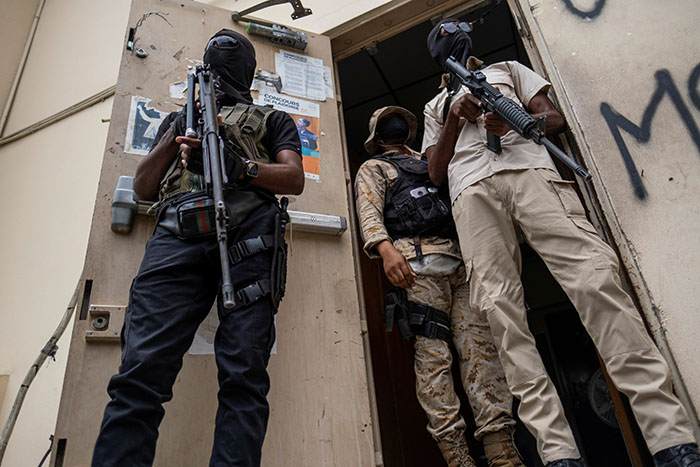
WINDSOR TERRACE — Haiti-born clergy in Brooklyn kept their emotions in check as a transfer of power in their homeland was completed Tuesday, July 20, following the assassination of President Jovenel Moïse.
In their lifetimes, retired Auxiliary Bishop Guy Sansaricq and Msgr. Pierre-André Pierre have watched fellow Haitians suffer tremendously. The July 7 assassination of Moïse tops a troubled history of natural disasters, poverty, gang lawlessness, and the pandemic.
Rebuilding is often a lengthy process — hence the guarded “wait-and-see” opinions of Bishop Sansaricq and Msgr. Pierre. Still, they join Haitians in hoping for the quick formation of a provisional government to manage the nation until elections can be held later this year. The first step toward stability was to finally settle who is the legal prime minister of Haiti.
On Tuesday, the Associated Press reported that interim prime minister Claude Joseph stepped aside, and Dr. Ariel Henry — who had been appointed by Moïse, before his death to succeed Joseph — finally took office.
Political instability has spurred anxiety for Haitians while their country is poised to receive its first shipments of COVID-19 vaccines.
“We have not even buried the president yet. And, you know, the fight seems to go on and on for power,” Msgr. Pierre said. “The most important thing is to see to the interests of the country. But it is not something that comes easily, especially when we look at the last happenings in Haiti.”
Joseph, with the support of the military and national police, took control of the government after gunmen stormed the president’s home, killing him and wounding the first lady, Martine Moïse. Prior to becoming the acting prime minister, Joseph was Haiti’s minister of foreign affairs and worship.
Moïse had appointed Dr. Henry, a neurosurgeon, to replace Joseph as interim prime minister through the next election cycle but Moïse was killed before Henry could be sworn into office. Previously, the doctor-turned-politician served as minister of interior and territorial communities.
Over the weekend, a United Nations board called the Core Group on Haiti, issued a statement calling upon “Prime Minister Designate Ariel Henry” to continue the mission of forming a “consensual and inclusive government.”
The Core Group comprises the ambassadors from Germany, Brazil, Canada, Spain, the U.S., France, the European Union, the special representative of the Organization of American States, and the special representative of the U.N.’s secretary-general.
During a press briefing on Monday, U.S. State Department spokesman Ned Price was asked if mentioning only Henry in the Core Group statement was a snub of Joseph, which could have accelerated his reported exit.
Price responded, “I’m not going to speak for Claude Joseph, I’m not going to speak for Mr. Henry. What I will say is that we have consistently supported a process that is inclusive, driven by dialogue, in an effort to achieve a consensus government to allow the Haitian people to later this year select their leaders.”
For decades, Haitians have suspected other nations of trying to control their government and injecting instability whenever convenient. They worry that other countries covet their natural resources. For example, some geologists speculate Haiti might have more crude oil reserves than petroleum-rich Venezuela.
Bishop Sansaricq and Msgr. Pierre work together at the Brooklyn-based National Center of the Haitian Apostolate. Bishop Sansaricq is the founder and director while Msgr. Pierre is the vice director.
They both said they had no information pointing to anyone or any country that might be pulling the strings on Haiti. But, the retired bishop noted, the assassination of Moïse was carried out through a “huge, huge conspiracy.”
“From the 28 people arrested,” he said, “only two were Haitians; 26 were Colombians. OK, it raises a lot of questions. Who paid them? Who allowed them to enter Haiti with heavy weapons?
“We cannot say the last word, because we do not know. Possibly, if the inquiry continues, we might have some more information in the coming weeks. But at the moment, I would say the discourse is incomplete.”
Bishop Sansaricq said he had no opinion about Dr. Henry.
“I heard that he is not a bad man,” the bishop said. “He might possibly bring forth some change. But will he be free? Or will he be simply the pawn? I don’t know. Anyway, the troubles in Haiti are not over.”
Msgr. Pierre, the former president of the Catholic University of Notre Dame in Port-au-Prince, said he hoped the current turmoil will reveal opportunities for Haitians to find ways to improve their nation and each other.
“I believe every situation in life draws a new line where we can look at the truth in a different way,” he said. “This is an opportunity to realize how nations can rise. So we look at the future while not repeating the same mistakes or surrendering to any kind of false presentation or false offer.”
